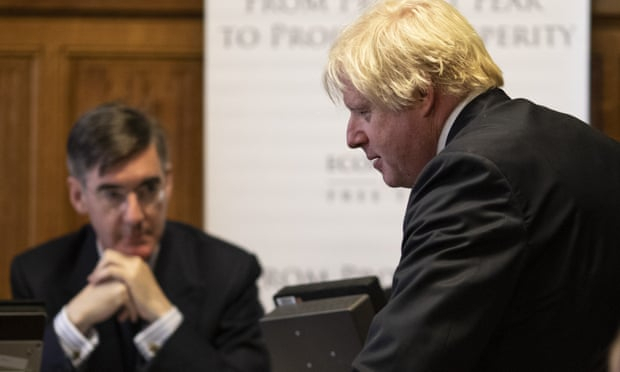But as the dust settles after months of chaos in Westminster, suspicions are growing on the other side of the Channel that the backstop could in fact be the very opposite: a brilliant deception device constructed by crack UK negotiators, which would allow a more reckless British prime minister to undermine the EU’s green and social standards while still keeping access to the European single market.
A new report, commissioned by the German Green party and seen by the Guardian, will exacerbate concerns in Berlin over the small print of the withdrawal agreement in its current form.
The deal, agreed between the EU and the UK in November 2018 but voted down three times in the House of Commons, states that the whole of the UK would remain in a de facto customs union with the EU until a trade and security agreement has been reached that prevents the setting up of a hard border between the Republic of Ireland and Northern Ireland.
To prevent Britain from diverting from EU standards on environmental or social protection after the backstop has come into effect, the customs territory would “include the corresponding level playing field commitments and appropriate enforcement mechanisms to ensure fair competition between the EU27 and the UK”.
The new German report, however, warns that the wording of the deal means the EU side will find it impossible to stop a more aggressive Britain led by a Boris Johnson or a Jacob Rees-Mogg from flouting such standards while still being able to export British products into the single market.
“If the EU wants to have a level playing field, it must not just set up the goals but also assign a referee,” said the author of the report, EU law expert Dr René Repasi. “At the moment it has even given the UK licence to assign its own players with officiating the match.”
While the withdrawal agreement states that Britain must not undermine European standards for social and environmental protection – such as those stipulated by working-hour directives or emissions targets – it doesn’t prescribe how the UK must ensure that these standards are kept, meaning a future government in London could in theory allow companies to self-regulate.
“Even if there were an independent referee such as an arbitration panel, it is unlikely that such panel will ever identify a breach of the agreement on behalf of the United Kingdom because the objectives of the level-playing field clause have been defined in such an abstract way,” Repasi told the Guardian.
The report, which suggests tightening the wording around social and environmental standards at the future relationship stage, will reawaken concerns about the deal, understood to be shared across the political spectrum.
Last autumn, EU member states were initially alarmed when informed of the plan for a UK-wide backstop. During talks, EU negotiators invoked the prospect of American chlorinated chickens, contaminated prawns or substandard Viagra arriving into the EU market via the UK – if the backstop was not watertight.
EU negotiators later insisted the safeguards contained in the withdrawal agreement were strong enough to prevent the inflow of such products. The backstop would “protect our single market” the EU’s chief negotiator, Michel Barnier, said in December, shortly after the agreement was endorsed by EU leaders. But as Westminster and the Irish border fade from view, old concerns are rearing their heads.
“The bitter reality for the EU is that the UK negotiated successfully in their interest to lower standards, limit freedom of movement but keep de facto market access,” said Franziska Brantner, a Green MP who commissioned the report.
If the UK’s main goal was to create a dumping zone, the British government certainly did a good job with the negotiations. But the question is whether lowering labour and environmental standards and consumer protection is actually in the interest of the British people. This deal shows the real intentions of the current British government.”
More about: #Brexit
















































